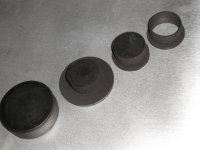Thank you.I run ER32 generally; I have ER chucks in R8 for the bridgeport and 40-taper for the horizontal. Having invested in that stuff I went ahead and got square and hex collet blocks, which I use quite often for all kinds of stuff that needs holding of round things. I tend to like the ER collets and the ER nuts with ball bearings do make setup/teardown a bit faster.
I recently got some 5C stuff for a indexer, there is a huge variety of 5C compatible tooling out there. I sprung for a cheapie 5C mounted 3-jaw chuck for the indexer just for funsies and its actually pretty good... ER is just collets.
A hex collet block in a 3-jaw lathe chuck works really well for small stuff in the lathe, but 5C blocks would also. Square blocks for the 4-jaw of course- same idea.
If you do end up going for ER, I'd suggest buying the collet chucks from Maritool. Made in the US, cost competitive and excellent quality. THey sell sets of collets too, though its a bit cheaper to buy them onsey-twosey as you need them.
Are 5C long like R8? They seem to be, but I've never held 5C in my hand. Do you think there's any appreciable different in length that matters?
5C not having the lock collar on the front does seem like it frees up some space, but I don't know if that really matters or not.
I never thought about using collet blocks to hold small things in a lathe chuck. That's a fantastic idea!
Last edited:

